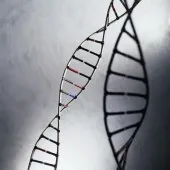Two studies identify gene mutations that act together to disrupt the brain's wiring before birth
WebMD News from HealthDay

By Brenda Goodman
HealthDay Reporter
THURSDAY, Nov. 21, 2013 (HealthDay News) -- Two research teams say they have pinpointed how changes in genes linked to autism act together to disrupt normal brain development.
Their studies, published Nov. 21 in the journal Cell, represent a leap forward in understanding the complex condition, said an expert who was not involved with the research.
"This gives us a moment in time when genetic risk for autism actually gets put into motion," said Robert Ring, a neuroscientist and chief science officer for the nonprofit advocacy group Autism Speaks. "This is very important."
That two research groups looking at different sets of genes came to the same conclusion "gives a lot of validity to the finding," Ring said.
Autism -- which impairs the ability to communicate, regulate behavior and relate to others -- is thought to affect about 1 in 88 children in the United States.
The mutations appear to come into play in mid-pregnancy. They interrupt the formation of specific cells that connect brain layers in a region that controls movement, sensory perception, conscious thought and language.
The changes appear to cause a sort of faulty wiring of the brain before birth, the researchers said.
They also said their findings might explain why early intervention programs, which enroll kids as young as 1 year old, help children with autism. Since their brains are still developing, they might be capable of correcting or compensating for some of these bad connections.
For both studies, researchers took advantage of BrainSpan atlas, an ambitious public project to catalog the gene makeup of the brain at many different ages. The brains used in the project are from 57 healthy, deceased males and females. Their ages ranged from six weeks after conception to 82 years old.
The work is groundbreaking, said one expert.
"This is something we couldn't have done two years ago because we didn't have this dataset," said Jeremy Willsey, a graduate student in genetics at Yale University.
Willsey led one of the studies, in which researchers focused on rare "lightning strike" mutations that caused a loss of function in nine genes. These mutations are changes to DNA that occur randomly, and aren't passed from parent to child. But previous studies have shown that individuals with autism often share these same random mutations.
Focusing on the actions of these nine genes, the researchers checked the BrainSpan atlas to see if any were working together at the same time. They found that those genes and others associated with autism worked together at only three distinct places and periods in development. Those corresponded to the deeper layers of the front of the brain between 10 and 24 weeks after conception.
The gene mutations seem to interfere with the development of nerve cells that connect different brain regions.
source : Research Probes Autism's Origins in the Brain








